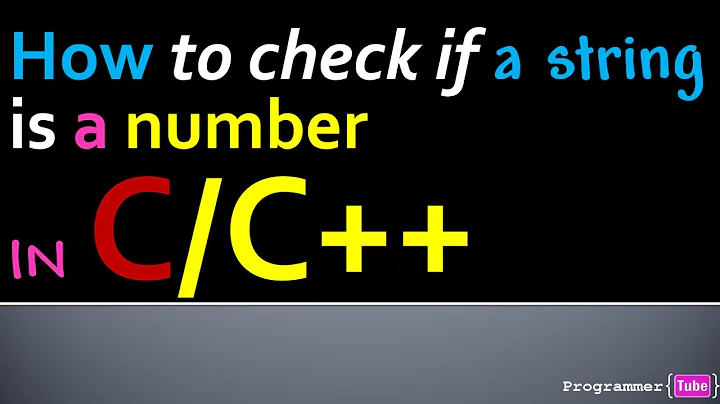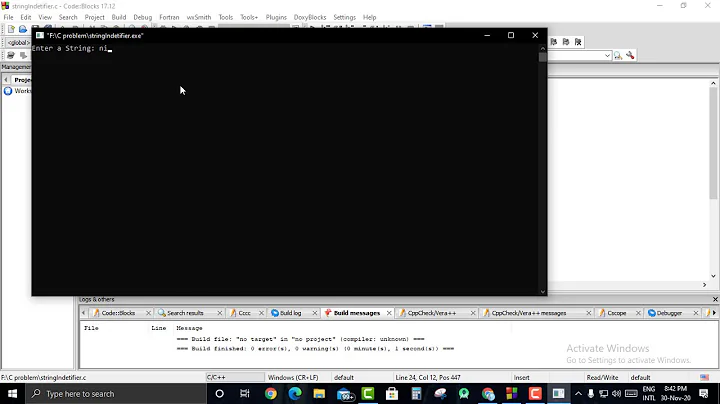How to determine if a string is a valid v4 UUID?
Solution 1
Version 4 UUIDs have the form xxxxxxxx-xxxx-4xxx-yxxx-xxxxxxxxxxxx where x is any hexadecimal digit and y is one of 8, 9, A, or B.
^[0-9A-F]{8}-[0-9A-F]{4}-4[0-9A-F]{3}-[89AB][0-9A-F]{3}-[0-9A-F]{12}$
To allow lowercase letters, use i modifier →
$UUIDv4 = '/^[0-9A-F]{8}-[0-9A-F]{4}-4[0-9A-F]{3}-[89AB][0-9A-F]{3}-[0-9A-F]{12}$/i';
preg_match($UUIDv4, $value) or die('Not valid UUID');
Solution 2
I found this question while I was looking for a Python answer. To help people in the same situation, I've added the Python solution.
You can use the uuid module:
#!/usr/bin/env python
from uuid import UUID
def is_valid_uuid(uuid_to_test, version=4):
"""
Check if uuid_to_test is a valid UUID.
Parameters
----------
uuid_to_test : str
version : {1, 2, 3, 4}
Returns
-------
`True` if uuid_to_test is a valid UUID, otherwise `False`.
Examples
--------
>>> is_valid_uuid('c9bf9e57-1685-4c89-bafb-ff5af830be8a')
True
>>> is_valid_uuid('c9bf9e58')
False
"""
try:
uuid_obj = UUID(uuid_to_test, version=version)
except ValueError:
return False
return str(uuid_obj) == uuid_to_test
if __name__ == '__main__':
import doctest
doctest.testmod()
Solution 3
All the existing answers use regex. If you're using Python, you might want to consider a try/except in case you don't want to use regex:
(Bit shorter than the answer above).
Our validator would then be:
import uuid
def is_valid_uuid(val):
try:
uuid.UUID(str(val))
return True
except ValueError:
return False
>>> is_valid_uuid(1)
False
>>> is_valid_uuid("123-UUID-wannabe")
False
>>> is_valid_uuid({"A":"b"})
False
>>> is_valid_uuid([1, 2, 3])
False
>>> is_valid_uuid(uuid.uuid4())
True
>>> is_valid_uuid(str(uuid.uuid4()))
True
>>> is_valid_uuid(uuid.uuid4().hex)
True
>>> is_valid_uuid(uuid.uuid3(uuid.NAMESPACE_DNS, 'example.net'))
True
>>> is_valid_uuid(uuid.uuid5(uuid.NAMESPACE_DNS, 'example.net'))
True
>>> is_valid_uuid("{20f5484b-88ae-49b0-8af0-3a389b4917dd}")
True
>>> is_valid_uuid("20f5484b88ae49b08af03a389b4917dd")
True
Solution 4
import re
UUID_PATTERN = re.compile(r'^[\da-f]{8}-([\da-f]{4}-){3}[\da-f]{12}$', re.IGNORECASE)
uuid = '20f5484b-88ae-49b0-8af0-3a389b4917dd'
if UUID_PATTERN.match(uuid):
return True
else:
return False
Solution 5
If you only need it for security (for example if you need to print it in a javascript code and you want to avoid XSS) it doesn't really matter the position of the dashes, so it's just:
/^[a-f0-9\-]{36}$/i
https://regex101.com/r/MDqB2Z/11
(It's not specific for v4, but usually a well written application store them as BINARY(16) after having dropped the dashes, so if something is wrong it will simply not find the object and throw 404, overvalidation may not be needed).
Related videos on Youtube
Comments
-
 Rafael almost 3 years
Rafael almost 3 yearsI'm making a validator based on UUID generated by client browser, I use this to identify a certain type data that the user sends; and would like to validate that the
UUIDthat client sends it is in fact a valid Version 4UUID.I found this PHP preg_match UUID v4, it's close but not exactly what I'm looking for. I wish to know if exists something similar to
is_empty()orstrtodate()Where if string is not valid SendsFALSE.I could do based on the regular expression but I would like something more native to test it.
Any ideas?
11/23/2019 EDIT: About the duplicate tag, while the moderator is technicallly correct, this question was formulated with the goal of fibd something else to regex if existed, and in second place this question has become a reference to Pythoners and PHPers and has a different answers/approach to solve the problem and their answers are better explained in general. This is why I consider this question should be perserved
-
jsbueno over 8 yearsThe question is for PHP, but for those of you wanting to do this in Python, the second answer bellow is very nice.
-
-
 Basil Bourque over 10 yearsBefore performing the regex, I might add a quick simple
Basil Bourque over 10 yearsBefore performing the regex, I might add a quick simpleIF()to test if the length of the string is 32 or 36 characters long. If not, it's not a UUID hex string. -
Garbee over 8 yearsIt should be clear that what you are showing is not PHP which is what this question is asking about. So it isn't exactly trivial to drop this code in and have it work, some care will be needed to use the Python UUID module from PHP.
-
Martin Thoma over 8 years@Garbee Thank you! I didn't notice that, because I came to this question via Google. Obviously, I didn't read the question carefully. I still think people who come to this question might be interested in my answer. I made it clear that my answer is a Python solution.
-
jsbueno over 8 yearsAnd, once the comments are removed, is an order of magnitude more readable and nice than the regexp one. Thanks!
-
Martin Thoma over 8 years@jsbueno You're welcome. I really like those comments as they add additional information and - just as you said - they can be ignored in case you don't need them :-)
-
jsbueno over 8 yearsI am in no way asking you to remove them - My intend was to remind anyone using this, that without those, this is a 4 liner. But while we are at it - is the comparison on the last line needed?
-
Martin Thoma over 8 years@jsbueno I'm actually not too sure atbout it. When I wrote this, I thought it was necessary. If I rember it correctly, it was related to UUID "fixing" some of the input mistakes. But I would have to look the UUID code up again.
-
 Thomas Ayoub almost 8 yearsMaybe you could explain a bit? By the way :
Thomas Ayoub almost 8 yearsMaybe you could explain a bit? By the way :return UUID_PATTERN.match(uuid)? -
Ωmega almost 8 yearsProper format of v4 UUID should contain dashes, as it stays in the answer. en.wikipedia.org/wiki/…
-
 Andrey Shipilov almost 8 yearsActually yeah, just return the match is better. What bit do you not understand here?
Andrey Shipilov almost 8 yearsActually yeah, just return the match is better. What bit do you not understand here? -
 Below the Radar almost 8 years@AndreyShipilov probably he does not understand why you answered with python code when the question is asking for php
Below the Radar almost 8 years@AndreyShipilov probably he does not understand why you answered with python code when the question is asking for php -
 Andrey Shipilov almost 7 yearsLol I actually didn't notice.
Andrey Shipilov almost 7 yearsLol I actually didn't notice. -
 Rafael about 6 yearsthis does not answer the question.
Rafael about 6 yearsthis does not answer the question. -
Horsty about 4 yearsIf you can't use the i modifier, you can use
^[0-9A-Fa-f]{8}-[0-9A-Fa-f]{4}-4[0-9A-Fa-f]{3}-[89AB][0-9A-Fa-f]{3}-[0-9A-Fa-f]{12}$ -
 Pēteris Caune about 4 yearsWatch out for UUID syntax variants that uuid.UUID() accepts: "{20f5484b-88ae-49b0-8af0-3a389b4917dd}", "20f5484b88ae49b08af03a389b4917dd"
Pēteris Caune about 4 yearsWatch out for UUID syntax variants that uuid.UUID() accepts: "{20f5484b-88ae-49b0-8af0-3a389b4917dd}", "20f5484b88ae49b08af03a389b4917dd" -
slajma about 4 yearsThanks @PēterisCaune nice addition - the case with
.hexessentially covers the last one you added but it's worth adding regardless. Wasn't aware of the "{uuid}" case. -
 Bastian Venthur about 4 yearsThis answer is wrong. Python won't always raise a ValueError. It will sometimes silently fix the input. uuid.UUID('6a3f6f5c-8df8-5b4e-8ec3-a8b2df62a40b', version=4) UUID('6a3f6f5c-8df8-4b4e-8ec3-a8b2df62a40b') mind the (5b4e-block in the middle!)
Bastian Venthur about 4 yearsThis answer is wrong. Python won't always raise a ValueError. It will sometimes silently fix the input. uuid.UUID('6a3f6f5c-8df8-5b4e-8ec3-a8b2df62a40b', version=4) UUID('6a3f6f5c-8df8-4b4e-8ec3-a8b2df62a40b') mind the (5b4e-block in the middle!) -
Swaru almost 4 yearsIf you can't use the i modified, you can use ^[0-9A-Fa-f]{8}-[0-9A-Fa-f]{4}-4[0-9A-Fa-f]{3}-[89ABab][0-9A-Fa-f]{3}-[0-9A-Fa-f]{12}$
-
the_nuts over 3 yearsIt does answer who looks for the simplest uuid validation
-
Mikhail Aksenov over 3 yearsBy the way - I tested that code and found that re.IGNORECASE is too expensive - much cheaper is apply lower() to uuid
-
 captainGeech over 3 yearsThis won't validate a UUID v4 specifically, as it requires a 4 and [8-b] in the proper positions. It is nice to ensure the proper charset though.
captainGeech over 3 yearsThis won't validate a UUID v4 specifically, as it requires a 4 and [8-b] in the proper positions. It is nice to ensure the proper charset though. -
 Vikram Ray over 2 yearsAlso this is true.
Vikram Ray over 2 yearsAlso this is true.is_valid_uuid('-2b1eb780-8a03-4031-b1e5-2f7674c60df3')>> True -
 Salma Hassan almost 2 yearsBe aware that
Salma Hassan almost 2 yearsBe aware thatstr(uuid_obj) == uuid_to_testwill cause valid uuids (but without dashes) to be identified as invalid. BecauseUUID(uuid_to_test)will add them even if not provided at first. -
Martin Thoma almost 2 yearsWhy do you think leaving the dashes away is valid? Is there a standard which defines them as optional? Can arbitrary many dashes be added?
-
 Salma Hassan almost 2 years
Salma Hassan almost 2 years












